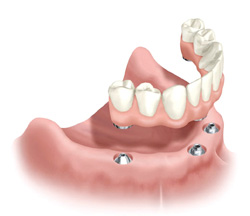 Have you lost teeth to decay or injury? Are you missing most or all of your teeth? If you have, you have a variety of options for addressing tooth loss with prosthetics and dental implants. Replacing missing teeth is important to maintaining good oral health. Because your jawbones, gums, and teeth work as a cohesive system, missing teeth can lead to further tooth loss, bone degeneration, and gum recession. For this reason, oral surgeons strongly recommend that patients suffering from tooth loss evaluate their options for replacement teeth with a dentist.
Have you lost teeth to decay or injury? Are you missing most or all of your teeth? If you have, you have a variety of options for addressing tooth loss with prosthetics and dental implants. Replacing missing teeth is important to maintaining good oral health. Because your jawbones, gums, and teeth work as a cohesive system, missing teeth can lead to further tooth loss, bone degeneration, and gum recession. For this reason, oral surgeons strongly recommend that patients suffering from tooth loss evaluate their options for replacement teeth with a dentist.
What Are All-On-4 Dental Implants?
The All-on-4 method for addressing tooth loss consists of placing four dental implants in strategic locations in the upper or lower jawbone to anchor prosthetic teeth in place permanently. Unlike dentures, which are removed for cleaning and during sleep, All-on-4 implants do not shift or slip throughout the mouth because they are anchored in place.
Made from titanium, implants are small screw-like pieces that are inserted into the jawbone by your oral surgeon. Because of titanium’s unique properties, the implants will fuse to bone over time similar to the roots of natural teeth. After the implants are placed, an arch of natural-looking prosthetic teeth are attached to abutments on the implant rods.
Candidates for All-On-4 Implants
Determining a patient’s candidacy for All-on-4 dental implants involves an examination with an oral surgeon. At your consultation, your dentist will take a variety of X-rays to discern whether you have the bone structure to support implants and a proper bite alignment. Successful candidates for this type of implant method should have good general health and a healthy immune system. Your oral surgeon will also take into account certain factors such as existing health conditions like diabetes and lifestyle habits such as tobacco use when determining your candidacy for this procedure.
Bridges vs. Dental Implants
Bridges are another option for replacing lost teeth but they differ from implants in their construction. The major difference between bridges and implants is the fact that bridges only replace the visible structures of teeth, not their roots. While bridges can improve oral function, they do not support bone health and many patients with bridges—especially those who have had them for a while—can lose bone mass. This makes All-On-4 dental implants a better option for many seeking to restore their smile. The All-on-4 technique can help patients with failing full arch bridges qualify for dental implants, even if they have already lost a significant amount of bone in the jaw.
To learn if All-on-4 dental implants are the best option for replacing your missing teeth, contact any of our four convenient oral surgery offices to schedule your one-on-one consultation.

Comments are closed.